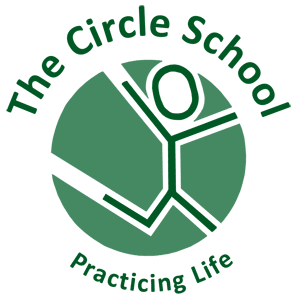The nice man is just trying to be friendly. “So you two girls go to The Circle School…What’s your favorite subject?”
The young girls are a little nonplussed. “We only take classes if we want to.”
“Oh. Well what do you do at school, if you’re not in classes?”
Brightening, the girls are now on familiar ground. “Mostly we like to climb trees.”
Now the nice man is confused. “How can you learn things like history if you’re climbing trees all day?”
The girls’ turn to look confused.
“Do you know what history is?”
“Sort of…”
Now the nice man is trying to help, to teach the girls something useful. “What do you think history is?”
“It’s like… things that happened…” the older of the two girls trails off.
Desperately trying to think of a polite rescue, I blurt out “I think you’ll find they know lots of history, even if they can’t define it.”
Now the man is in full-on teaching mode. “I see. So, do you know who was America’s first president?”
Both girls brighten, and the younger one smiles broadly: “George Washington; everybody knows that!”
“Well, how did you learn that? Can you learn that by climbing trees?”
Much dimmed, she murmurs “I think my mom told me.”
To my great relief, the conversation is interrupted by the arrival of the person we had come to see.
Some version of this painful exchange happens all too often when our students try to represent their experience with adults who are new to The Circle School. I think it highlights a very deep philosophical gulf between those who have experienced the magic that is The Circle School and those who have not. In simplest terms, most people associate the word “school” with teaching, while we associate the word “school” with growth and development.
The nice man (and he really was well-intentioned) isn’t even aware that his view of education is limited to a very narrow range of life experiences. Given a list that includes crucial and difficult assets like time management, teamwork, responsible self-reliance, critical thinking, civic engagement, and emotional stability, the comparatively simple subject of history falls far down on my list of essential skills for a well-rounded education.
But history can be “taught” (though not as easily as it can be learned) whereas those other assets simply cannot be taught in a coercive school environment. They must be struggled with, by learners, on their own time and in their own way. Easy stuff, like history, arithmetic, and literature, come along on their own – a side effect of an active life in a free community. The reverse, picking up emotional stability as a side effect of listening to a teacher talk about the presidents, ain’t gonna happen.
Yes, it is not only possible to know lots of history without taking a history course, it is very common at The Circle School. For us, school is a place where people explore their worlds, inner and outer, freely and responsibly, in a diverse and supportive community. Where the entire range of human skill, knowledge, creativity, and endeavor is available for striving and achievement. Where kids live their lives, growing and learning every day.
Most schools are about teaching. The Circle School is about life.

Hi JD, I love this post! Would you mind if I post it (with proper acknowledgment) on the Mt. Laurel Sudbury School blog?
Thank you,
Susan West
Mountain Laurel School Assembly President